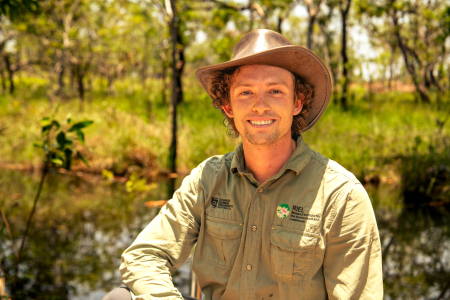The Northern Territory’s dusty red tracks are a long way from the city streets of Chicago, but for Charles Darwin University (CDU) PhD candidate Adam Rexroade, his commute to work is far more exciting and adventurous down under.
Mr Rexroade’s research has taken him from the NT to Far North Queensland, to discover how carbon cycles through streams and rivers and affects tropical ecosystems.
He said while his postgraduate degree in America had inspired him to study a PhD, it was the allure of the NT and its abundance of natural landscapes that drew him to the Top End of Australia.
“Studying a PhD at CDU has been a great opportunity for me to get out in the field, see some amazing parts of Australia, collect important data and connect with fellow researchers in my field,” Mr Rexroade said.
“This research is really exciting for CDU and the NT because it will represent an ecosystem that generally doesn’t have a lot of raw data about greenhouse gases, and we can potentially apply what we find to other tropical ecosystems around the world that we aren’t able to measure so efficiently.”
Mr Rexroade also noted tropical regions have been understudied compared to temperate regions.
“A lot of our global understanding of greenhouse gas and carbon cycling comes from temperate regions in north America and Europe, where they have sufficient infrastructure to support large-scale environmental monitoring programs,” he said.
“So, we are providing a very unique data range in this study. We’re starting to be able to answer questions about the effect of wet seasons on carbon capture and transport, how this could affect the climate, and if different patterns could affect tropical ecosystems in the future.
“On a global scale, this research is important because it allows us to understand where carbon is, where it comes from, and what form it’s in, as well as how it’s changing in kind of the role with climate change.”
The study is one of two Australian Research Council funded projects led by CDU Senior Research Fellow and supervisor Dr Clément Duvert, which seek to determine the amount of terrestrial carbon that leaks into rivers across Australia.
Dr Duvert said this research is particularly valuable across Northern Australia’s tropical climates, and will contribute to knowledge on how carbon cycles through similar environments across the world.
“Measuring the transport of carbon through aquatic systems and pairing this with estimates of carbon production from Terrestrial Ecosystem Research Network (TERN) observatories will help us get more certainty around how much carbon Australian ecosystems can actually store,” Dr Duvert said.
“We want to know how much carbon is lost through streams and rivers, otherwise we will be overestimating the ability of ecosystems to capture carbon dioxide. This area of research is relatively new in Australia and collaborating with partners from Europe and the United States has been adding much value to our projects.
“As we move towards a carbon economy, we will need to get better at tracking carbon and understanding the role of different land uses and of a changing climate, in terms of how carbon is stored and released.”
More research opportunities with Dr Duvert and other CDU academics at CDU’s Research Institute for the Environment and Livelihoods can be found here.







